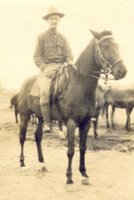 Ray McAllister’s column in today’s Richmond Times-Dispatch touches on a sliver of history that many have probably forgotten, or never knew in the first place. Richmonders have guarded the Mexican border before: In 1916 the Richmond Light Infantry Blues were dispatched to Brownsville, Texas to watch over the border and chase Pancho Villa.
Ray McAllister’s column in today’s Richmond Times-Dispatch touches on a sliver of history that many have probably forgotten, or never knew in the first place. Richmonders have guarded the Mexican border before: In 1916 the Richmond Light Infantry Blues were dispatched to Brownsville, Texas to watch over the border and chase Pancho Villa.“If President Bush does deploy thousands of National Guard troops, including Virginia's, to the Mexican border, it won't be their first trip. In 1916, President Woodrow Wilson mobilized a whopping 158,664 Guardsmen from all 48 states and sent them to protect the length of the border. They were moved to camps in Texas, New Mexico, Arizona and California.
“That time, it wasn't Mexican immigrants they were trying to keep out.
“It was Pancho Villa.”
Follwing that campaign in 1917 the Blues were sent to Fort McClellan, located in the Alabama foothills, near the town of Anniston, for additional training. Then it was off to France to finish off the Great War, the war to end all wars. My grandfather, Frank W. Owen (1893-1968), seen in the 1916 photo above, was one of those local boys in that Richmond Blues contingent sent first to Brownsville.
Owen grew up in South Richmond in what was then called Manchester. As a young man he had mostly made his living as a vocalist. The stories I remember him telling from his years as a soldier were all about his singing gigs, playing football and adventures with his pals. And, a few fistfights. (Owen, in football gear? is on the right in the photo below.) Like other men of his generation, who saw war firsthand, he apparently saw no benefit in talking about the actual horrors he'd seen. However, he was always quick to point with pride at having been in the Richmond Blues, then seen by many as an elite corps.

Eventually Owen became a draftsman, then an architect, with the Chesapeake & Ohio Railway (forerunner to CSX), which was then based here in Richmond. He continued to perform as a soloist and in barbershop quartets into his 60s. He was a man who believed in his own view of life, without hesitation, and he passed what he could of that on to me.
Here’s the link to a piece I wrote some years ago about that same F. W. Owen, and a lesson he taught me one afternoon that has stuck like glue. It’s called “The Cheaters.”
“...This was the summer he taught me, along with a few of my friends, the fundamentals of poker. To learn the game we didn’t play for real money. Each player got so many poker chips. If his chips ran out, he became a spectator. The poker professor said he’d never let us beat him, claiming he owed it to the game itself to win if he could, which he always did. Woven throughout his lessons on betting strategy were stories about poker hands and football games from his cavalry days, serving with the Richmond Blues during World War I.”

No comments:
Post a Comment